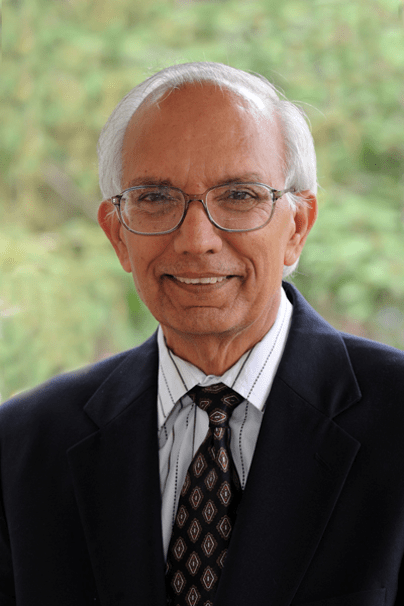Professor Rattan Lal, Distinguished University Professor of Soil Science, School of Environmental and Natural Resources, and Director of the CFAES Dr. Rattan Lal Carbon Management and Sequestration Center (C-MASC), will change your mindset when it comes to food security and indeed life on earth. That’s how big his reconceptualization of soil is; it’s a total paradigm shift from taken-for-granted ideas about farming and agriculture. He looks at soil as the all-encompassing organism of life on Earth, and soils as a being either “alive” or “dead.” In Dr. Lal’s words, “Soil biota is the bio-engine of the Earth” (2019 Japan Prize Presentation). “Soil biota” is a reference to the life-support elements of the soil, naturally occurring carbon, minerals, other nutrients, and the microorganisms which exist there. His specialty is carbon sequestration, but his expertise goes far beyond the carbon aspect of soil research. Water, an important part of this “living soil” equation, remains central to the question of food security, his area of expertise. Soil health and organic carbon stock are necessary protections of our water resources (2019 Japan Prize Presentation). According to Lal, fertile and productive soil is essential to the food and water security that humanity and indeed all life on earth require. You can listen to our interview with Professor Lal on “The Spiritual Meanings of Soil.”
Professor Lal, Laureate of the GCHERA World Agriculture Prize (2018), Glinka World Soil Prize (2018), the Japan Prize (2019), and the U.S. Awasthi IFFCO Prize (2019), and the World Food Prize (2020), speaks around the world on matters relating to the environment and food security. He is acquainted with nearly every type of environment and local climate and how agricultural practices adapt to diverse circumstances. He spoke at the U.N. Climate Summit in Morocco in 2016 and 2019 (pictured below), in Spain in 2019, and in Bonn, Germany in 2018. He presented Distinguished Service Medals to the Minister of Agriculture of Morocco in 2019, to the Minister of Environment of Germany in 2018, and to the Minister of Agriculture of France in 2017. Professor Lal remains very generous with his time, however. Especially when it comes to educators, Professor Lal makes every effort to free himself up to give a lecture and converse with interested teachers at every level and in every discipline. He spoke to teachers in our Global Seminar on agriculture last summer on the critical role of soil in saving our atmosphere, protecting the living things on Earth, and how humanity can ensure food security into the future.
Professor Lal’s most recent award, the World Food Prize, recognizes scientists who have made strides in securing the world’s food supply. Currently, 2 billion are food-insecure. As Lal says,”2 billion people are coming to dinner. How are we going to feed them?” His work on soil and defining agricultural practices based on both science and practical approaches revolutionize our ability to maintain soil health while also producing abundant crops. His perspective on soil and what he calls “the Rights of Soil” considers an array of farming practices, both high-tech and traditional, that respect the soil’s need to be consistently replenished after crops have withdrawn carbon and nutrients. Because the soil can’t merely grow plants, it must grow plants that are full of the vitamins and minerals our bodies need to thrive.
Professor Lal’s global vision for food security is comprehensive and translates science into action (2018). If farmers around the world adopt the practice of planting cover crops, or crops planted to revitalize the soil, it could have major positive impacts on climate change, water resource management, and food security. You can hear him explain this idea in his own words below in the 2-minute video, “translating Science into Action.” We invite you to watch additional videos we link to below which explain his vision more detail, in addition to some key articles that address our most urgent global issues, including an article he wrote on COVID-19 pandemic and what it’s teaching us about climate and environment (Lal, 2020b). Agriculture is a key culprit in the global water crisis, as it uses up 70% of freshwater worldwide (Ritchie, 2017). At the same time, it also is a major contributor to climate change (Lal, 2018), especially when the aforementioned extractive processes are used to grow crops. Yet, humanity needs agriculture for its food and therefore its survival, a terrible conundrum we face as a species. Yet, there is hope, Lal states that all farmers would have to give up is 10 percent of their crop yield if they implemented sustainable practices (2018).
Sources:
Rattan Lal: Translating Science into Action | CFAES. (2018). Retrieved January 14, 2021, from https://cfaes.osu.edu/news/videos/rattan-lal-translating-science-action
Dr. Rattan Lal Gives 2019 Summer Commencement Address. (2019). https://cmasc.osu.edu/news/dr-rattan-lal-gives-2019-summer-commencement-address
Lal, R. (2004). Soil carbon sequestration impacts on global climate change and food security. Science. https://doi.org/10.1126/science.1097396
Lal, R. (2013). Soil and Sanskriti. Journal of the Indian Society of Soil Science, 61(4). https://www.indianjournals.com/ijor.aspx?target=ijor:jisss&volume=61&issue=4&article=editorial
LAL, R. (2015). The soil–peace nexus: Our common future. Soil Science and Plant Nutrition, 61(4), 566–578. https://doi.org/10.1080/00380768.2015.1065166
Lal, R. (2019). 2019 Japan Prize Commemorative Lecture: Prof. Rattan Lal. https://www.youtube.com/watch?v=CEpCv9BwEWc
Lal, R. (2020a). Soil Matters. https://u.osu.edu/globalteacherseminar/resource-guide-middle-east/
Lal, R. (2020b). Soil Science Beyond COVID-19. Journal of Soil and Water Conservation.
Lal, R. (2020c). Where Does our Food Come From? It’s the Soil Stupid.
Lal, R. (2020d). World Food Prize Digital Dialogue: Live with the Laureate. https://www.youtube.com/watch?v=GYVYvWv2S1w
Semantic Scholar Link. (n.d.). Retrieved May 23, 2020, from https://www.semanticscholar.org/paper/Soil-carbon-sequestration-impacts-on-global-climate-Lal/9151910efb402f695ec52f006c5628fb29791d49
Hannah Ritchie (2017) – “Water Use and Stress”. Published online at OurWorldInData.org. Retrieved from: https://ourworldindata.org/water-use-stress

